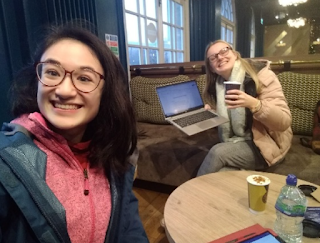Five (and a half) Ways to be Sustainable by Sophie Cragg
Placement Student Sophie Cragg from Nottingham Trent University shares her experience doing research into sustainability in the heritage sector for Culture Syndicates. See excerpts from the group research presentation here.
Image credit: Sophie Cragg and Anna Stanley
Hello histo-readers,
This term, I had the privilege to work with Culture Syndicates who are a non-profit heritage and arts consultancy who develop employability programmes for emerging sector entrants such as ourselves. Their Heritage Assistants Model gives people the crucial paid experience that is essential for any application into heritage.
It beats sitting in the library with a pile of dusty books any day! One of the best things about Culture Syndicates is its location: The National Justice Museum. We were honoured to have a private tour around the museum which was thrilling (but very spooky!).
One of our missions was to research how COVID-19 had impacted the sustainability of museums. This is at the heart of Culture Syndicates’ work which benefits not only the museum but our own development. Here are the West Midland museums that I researched:
- Black Country Living Museum, Birmingham
- Pen museum, Birmingham
- Leominster museum, Herefordshire
- Mythstories museum, Shropshire
Have you visited any? If so, what did you think? I am yet to visit!
Did you know that 2.7 million people visited museums in the West Midlands in 2020 and that generated £61.3 million? This shows how important it is that heritage sites are sustainable.
Here is our check list to see if you could be sustainable:
1. Are you environmentally sustainable?
The Black Country Living Museum have recorded the travelling of their visitors and realised that 95% of visitors arrive in fossil-fuelled cars. The Pen Museum is also proud to be in Birmingham’s clean air zone and is only a 10-minute walk from the central shopping area.
2. Where do you see yourself in 10 years’ time?
Most heritage sites have a 5–10-year strategy plan but 2019 has been a glitch in this! The myth stories hope to keep oral heritage alive as the storytelling is a gateway to communication skills and this would be through raising their profile and developing audience.
3. Do you accept help from others?
156 museums across the UK benefitted from the recovery grants and the Museum Development Network gave funding to small museums that did not receive funding from large national bodies such as the National Lottery Heritage. Not only this, but local councils have a major role as Mythstories received a £1000 grant from the Shropshire council.
4. How has your work changed?
The Pen museum’s staff costs were £18,500 in 2020 but were cut to £15,600 in 2021. This shows how we need to make sacrifices but be adaptable throughout the pandemic.
5. Are you good with computers?
The Museum Development network helped run events such as access planning and live streams for museums. These were the entertainments that kept us going throughout lockdown!
0.5. Are the amount of cake and coffee breaks sufficient?
If you have scored less than 4 (and a half) then Culture Syndicates are here to help! My experience with Culture syndicates has been a 10/10 that I shall never forget.
Sophie Cragg
Placement Student
Nottingham Trent University





Comments
Post a Comment